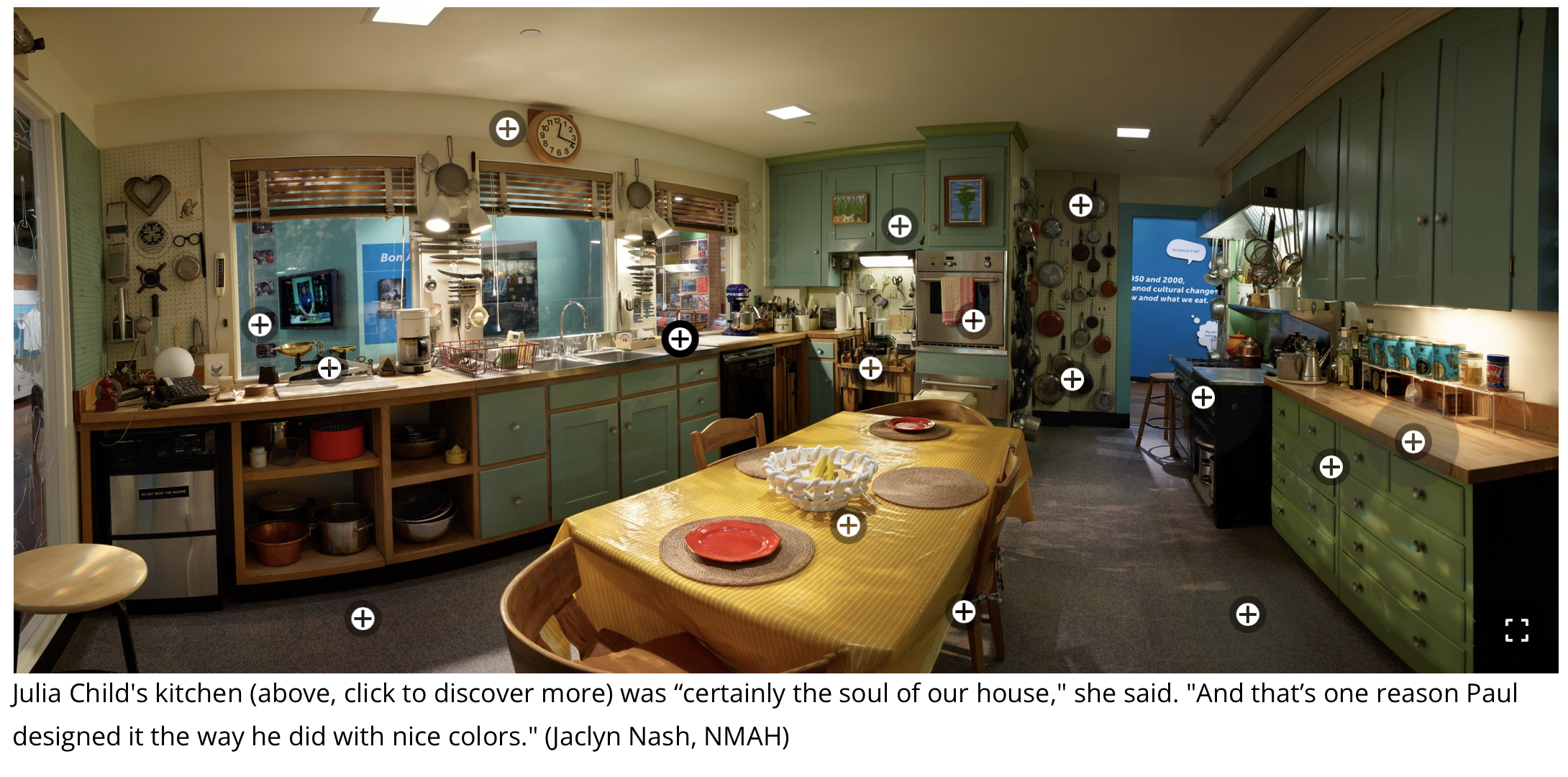Video #1: Introduction
Premiering at 5 pm PST
Bon Appétit!
Composed by Lee Hoiby
Julia Child had an immense impact on American households and housewives. Because of the technology in the 1960s, her PBS cooking show was unedited, which showcased her blunders and mistakes to audiences which ultimately created an "authenticity and approachability to television." According to Toby Miller in his article, "Screening Food: French Cuisine and the Television Palate," one mother he spoke to said that sometimes "all that stood between me and insanity was hearty Julia Child" because of Child's ability to soothe and transport her. In addition, Miller notes that Child's show began before the feminist movement of the 1960s, which meant in part that that the issues housewives and women were facing at the time were largely ignored on television.
Lee Hoiby composed Bon Appétit! In 1985 for American actress and his friend Jean Stapleton, who sang the 1989 premiere at the Kennedy Center and later performed it in an off-Broadway run. The libretto for Bon Appétit! Was adapted by Hoiby’s frequent collaborator and partner Mark Shulgasser from transcripts of two different episodes of Child’s TV show, The French Chef. The overwhelming popularity of Child came not just from her culinary expertise but from her self-deprecating humor, her authenticity and relatability, and her matter-of-fact style.
Julia Child (1912-2004) is a beloved American icon, known for her larger-than-life personality, who revolutionized American cuisine through her award-winning cookbooks, television cooking shows and French cooking school. Child was incredibly passionate about food, especially French cuisine. Child recalled her first meal at La Couronne in Rouen as a culinary revelation and described the meal of oysters, sole meunière, and fine wine to The New York Times as "an opening up of the soul and spirit for me."
In 1951, she graduated from the famous Cordon Bleu cooking school in Paris and later studied privately with Max Bugnard and other master chefs. She later joined the women's cooking club Le Cercle des Gourmettes, where she was introduced to Simone Beck, who was writing a French cookbook for Americans with her friend Louisette Bertholle at the time. Beck proposed that Child collaborate with them to make the book more appealing to Americans. In 1951, Child, Beck, and Bertholle began to teach cooking to American women in Child's Paris kitchen, calling their informal school L'école des trois gourmandes (The School of the Three Food Lovers). For the next decade, as Child and her husband Paul moved around Europe and finally to Cambridge, Massachusetts, the three “food lovers” researched and repeatedly tested recipes. Child translated the French into English, making the recipes detailed, interesting, and practical. In 1961, they completed their groundbreaking cookbook, Mastering the Art of French Cooking. Her book and the popular television show that followed made the enigma of fancy French cuisine more approachable, introducing gourmet ingredients, teaching new culinary techniques, and most importantly, encouraging the everyday "home chef" to practice cooking as art and not to dread it as a chore.
Bake the cake yourself!
Visit Julia Child’s kitchen!
Click the link below to get up close and personal with every little detail in her kitchen…
Miss Manners on Music
Composed by Dominick Argento
Judith Martin, aka Miss Manners
Argento completed the song cycle just in time for Judith Martin’s birthday and the set premiered in the fall of 1998 at the Cosmos Club in Washington D.C., by mezzo-soprano Phyllis Pancella and pianist Tim Hoekman.
Dominick Argento was a prolific American composer for voice, having written fourteen operas, several song cycles and various choral works. Argento was known for combining tonality, atonality, and a lyrical use of twelve-tone writing, which always upheld the integrity of the text he was setting. In 1975, Argento had won the Pulitzer Prize for Music for his song cycle From the Diary of Virginia Woolf. Argento coined his song cycles as “monodramas,” because of his use of more dramatic text. For this reason, his song cycles acted less like distinct groupings of songs but more like true dramatic works.
The texts chosen from the Miss Manners newspaper column provided an opportunity for a creative musical setting in which Argento used musical devices to bring about both the topics at hand and the humorous examination of etiquette faux pas. All of the columns Argento chose to work with related to music in some form or another which included“Prologue,” “Manners at a Concert,” “Manners at the Ballet,” “Manners for Contemporary Music,” “Manners at a Church Recital,” “Manners at the Opera” and “Envoi.” Argento found a way to incorporate musical elements from each artistic practice being discussed in that individual song. From his use of a more twelve-tone, atonal approach in his “Manners for Contemporary Music,” to his use of plagal cadences (also known as the “amen” cadence) in “Manners at a Church Recital,” we not only get an etiquette lesson on each type of performance, but we actually hear elements of that music being employed. Argento masterfully illustrates Miss Manners’ eccentric personality by implementing perfect comedic timing and musical gestures that whole-heartedly support and accentuate the text.
Miss Manners on Music is a set of seven songs for mezzo-soprano and piano, composed by Dominick Argento and based on texts of Judith Martin, also known by her pen name, “Miss Manners,” the name of her nationally syndicated column about etiquette. Judith Martin’s husband, Robert Martin, had wanted to commission a piece of music from Dominick Argento (his wife’s favorite living composer), as a surprise for her sixtieth birthday. Argento was initially reluctant to compose such a set and had actually avoided Robert Martin’s request for almost three years. Argento finally agreed and decided to compose a song set based on various texts from the Miss Manners column. Argento was a composer who was driven by text, and after going through many volumes of Miss Manners columns and finding the perfect text for the project, he was much more inspired to see the project through.
“After I assembled and studied a possible text consisting of seven excerpts, my interest began to waken to the task, and by the time I started composing the music I was enthusiastic about the project. As is always the case, once the text was right, composition went rapidly.”
-Dominck Argento
Dominick Argento
Judith Martin, aka Miss Manners
Video #3: Miss Manners on Music
Premiering at 5:45 pm PST
Peruse the Miss Manners archives…
Have an etiquette question yourself??
Click the link below and send your question directly to Miss Manners herself!
Acknowledgments
A very special thank you to my two collaborative pianists, Younghwa Ha and You Zhao, who not only helped me immensely in the preparation of this recital, but whose level of artistry and musicianship continuously inspire me! Thank you to my good friend and student, Kevin, who not only let me borrow all of his fancy recording equipment for this project, but who also edited the Miss Manners cycle entirely on his own! A big thank you to the faculty of the vocal arts department at the University of Southern California who were incredibly supportive of me and this project. I can’t say thank you enough to my teacher and mentor, Professor Helding, who has taught me more than I could have ever imagined over the last three years, and who has always supported and challenged me as a performer, teacher and arts presenter.
Finally, thank you to my incredible family— my mom, Ann, my dad, Steve, my sister Nancy and my amazing husband, Alvaro and our two fur babies Nala and Milo.











